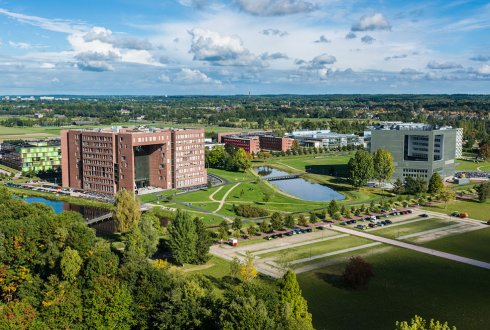

PhD Grant Available -Wagenigen University – Disease and production monitoring using Big Data analytics
- Post by: choiru
- July 16, 2020
- Comments off
Background
The environmental condition of the fish farm sites are important since they are the basic values for the determination of the balance between fish farming activities and its recipient environment. Producing fish in a sustainable way is challenging, as low efficiencies increase the environmental burden of aquaculture as well as reduces profitability. By improving both efficiency and yield the sector could grow without increasing its environmental impact. Today decisions are mainly based on empiricism rather than accurate data. Incorporation of SMART technologies for controlling the basic parameters aims to provide fish farmers with clearer insight in their fish production for example by data on oxygen and temperature, feed demand and fish behaviour. Sensors can provide information that facilitates continuous production and environmental improvement.
SMART fish farming technologies have the potential to improve the efficiency, reduce energy use and greenhouse gases emission, labour costs, and fish diseases, and can stimulate the understanding of the production process as well as protecting the environment. Although the introduction of technologies generally support modernization, the development and use of smart technology in Indonesian aquaculture is still underdeveloped. At present, we do not have a clear view of the technologies implemented, the effect on Indonesian fish farming systems, and the potential of new technologies.
PhD topic
The SMART technologies that are being developed for on-farm disease diagnosis, and disease and water/milk quality monitoring can be supported with Big Data analytics for discovering new knowledge. Animal health information, as well as the diagnosis of individual cows with diseases, can be determined using the state-of-the-art machine learning methods, techniques, and tools. In this research, the data that will be generated within the system infrastructure will be utilized using machine learning approaches.
First, after data cleaning, harmonization and integration, and determining baseline disease incidence and milk quality, spatial and temporal deviations from this baseline (indicative for disease outbreaks) are determined. Deviations are investigated to define the threshold at which an early warning should be generated by taking into account the required levels of accuracy, sensitivity, and specificity.
Second, data from milk samples are used to train machine learning algorithms for the prediction of deviations in milk composition and mastitis.
Third, the same is done for water quality monitoring, where the nutritional status of the pond and activity of the fish is monitored, and early warning systems are installed that identify under- or over-nutrification or deviant fish behavioral patterns.
Fourth, the robustness of different types of ponds (e.g. shrimp versus fish, nutritious ponds versus regular ponds, brackish versus freshwater) against temporal and spatial deviations is analysed, making it possible to define the best system under different circumstances. Machine learning methods, techniques, and tools, derived from the latest developments in Big Data analytics, will be used in this research. Specific attention will be given to transforming Big Data models into operational decisions and deploying models to improve sustainability outcomes (e.g., defining the best feeding regime in terms of availability of nutrients, pond water quality and fish production). Expected outcomes are insight in milk quality, water quality and epidemiology of the disease, evaluation of the impact of the interventions on farming system stability, and four publications for scientific international journals.
Required background
- A BSc/MSc degree in Computer Science or any related discipline.
- Experience in image processing/computer vision techniques
- Experience with machine learning platforms such as scikit-learn, TensorFlow, and Keras
- Experience in programming languages such as Python, R, and Java
- Proven experience with data analytics
- Excellent oral and writing communication skills in English
- Passion for doing research with farmers and other stakeholders
- Enthusiasm in working in an international and interdisciplinary team and in two countries (Indonesia and the Netherlands)
Further information
The PhD will be obtained from Wageningen University, the Netherlands. The research will be divided between Indonesia (30 months) and Wageningen University, the Netherlands (18 months). Research costs including visa, travel costs for travelling within the project, and costs associated with data collection are covered by the project. For the period in Wageningen, a grant is available to cover salary costs. Salary costs in Indonesia are not covered in the project, so we have a strong preference for candidates that can support themselves or are supported by their employer. However, in the circumstance where a candidate is unable to find this support but has outstanding credentials, the project team will consider supporting him or her during their research time in Indonesia.
In order to be admitted to the Wageningen University PhD programme, selected candidates will have to go through the admission procedure. A proven sufficient level of English proficiency as indicated by an IELTS score of 6.5 (with a minimum of 6.0 for speaking) is required.
Next to this position, four other PhD positions (with different topics) are open in the project. Of these five positions, three will be supported by an LPDP scholarship. The LPDP scholarship is a personal grant that will cover all salary costs, both in Indonesia and in the Netherlands. Selected candidates are encouraged to enrol in the LPDP scholarship application. They will have to go through an additional procedure to compete for the LPDP grant.
For more information please contact prof. dr Ynte Schukken (ynte.schukken@wur.nl) or dr Yeni Herdiyeni
(yeni.herdiyeni@apps.ipb.ac.id)
To show your interest, please submit your CV and a letter of motivation before August 23, 2020, to Dr Marjolein Derks (marjolein.derks@wur.nl)